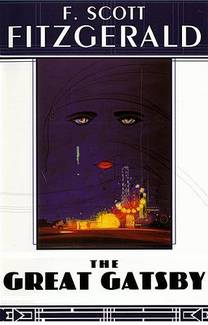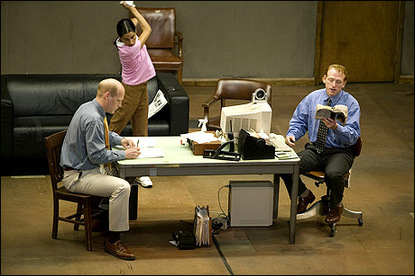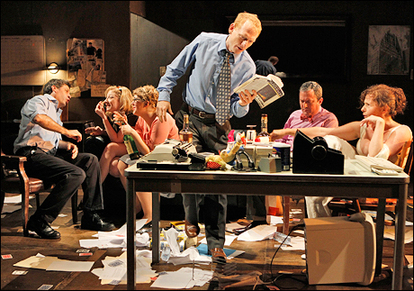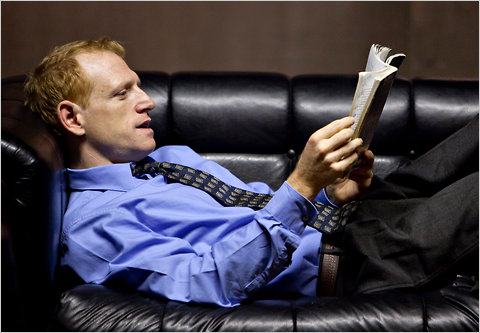|
When a great novel is adapted for the screen, everyone complains. They changed this, they changed that. She wasn't at all as I imagined her. Et cetera. In many cases, these are valid gripes, if also a little beside the point. The real problem with film adaptations is time. A novel, even a short one, is meant to be read over several hours, maybe even several days or weeks -- or in the Victorian era, several months. (Months!) It has to settle. It ought to live with you for awhile, allowing you to mistake your doctor friend for the doctor in your book. A movie, on the other hand, is meant to be watched in a single ninety to two hundred minute session. (And when it's the latter, all the doctors in the room fall asleep.) But even in two hundred minutes, there simply isn't time to get it all in. Everything happens too fast. In response to this thorny dilemma, the BBC has studiously offered miniseries adaptations of literary classics for years, and while these multi-hour affairs usually come closer to representing the full novels on which they're based, even they lose something in translation. Adaptation is, after all, a fairly imperfect operation. But what if you didn't adapt the text at all. What if you just...read it? (Stunned silence. Somewhere out there, a doctor is already asleep.) It sounds awful, like one of those marathon novel readings brave nostalgists are always organizing of Ulysses and Moby-Dick. But could it possibly also be transcendent?  Classic Scribner edition. Classic Scribner edition. Elevator Repair Service certainly hopes so. This is the NYC-based company that thrilled me with The Select, its production of Ernest Hemingway's The Sun Also Rises back in October. So thrilled was I that I hunted down the next performance of Gatz, its most celebrated production (of F. Scott Fitzgerald's The Great Gatsby). It would be playing in Scott's own Princeton, New Jersey, in December. Matt was interested, and so were our parents. We would all drive up and see it together! This marathon eight-hour experience. And don't get me wrong: it was a marathon. There were many things to consider. Should I drink more coffee to stay awake, or less to avoid unnecessary trips to the bathroom? (Even with a break every ninety minutes, this was somehow a concern.) Who gets to sit on the aisle -- the person with the longest legs, or the person with the stiffest joints? Can I even be comfortable in a knee-tight theater seat this long? How long before one of us just loses it and snaps, too cranky and worn-out from sitting right next to each other all day to be on our best in-law behavior? Somewhere in the middle of the first act, the spacey-cool voice of Ted, from my morning yoga video, came back to me. Life throws challenges at you, he'd said, as we lunged forward, tangling our arms up between our legs. You've just gotta let yourself sink down a little further and breathe through them. Be still. Be strong. I sank. I was still. I tried very hard not to accidentally elbow my mom. It was excruciating. But as does yoga for my stubborn hips, eventually, Gatz opened me up.  Jim Fletcher (Gatsby), Susie Sokol (Jordan), and Scott Shepherd (Nick). Jim Fletcher (Gatsby), Susie Sokol (Jordan), and Scott Shepherd (Nick). E.R.S. starts with the premise of a bunch of people in a vaguely 1990's-era office. A guy comes in wearing a tan trench over a blue shirt and slacks, lost in his routine. He turns on his computer, he sits down, prepared to face another day. But the computer will not start. He pushes buttons. He counts off the seconds on his hand and pushes buttons again. Nothing. He looks around his desk, and at the other, silent coworker in the room. What to do? Idly, he flips open a large Rolodex. There, inside, is a paperback book. And not just any book. Even from the back row, we can see that it's that vaguely glossy, inflexible Scribner edition of The Great Gatsby we all read in high school, with the art deco title and the weird face emerging from the blue. He opens it. He begins to read aloud, haltingly and rather bemused at first, as though it were the first time he'd encountered the voice of Nick Carraway, and the miniscule, but merciless divide between East and West Egg. Other coworkers emerge before long, delivering memos, sorting mail, none looking too happy to be there. The boss comes in too, a tall, balding man with confident, money-making strides and a tragic loom like Frankenstein's monster. And still, despite their interruptions, our blue-shirted hero reads on, becoming gradually more absorbed in the book, as I sank deeper into my seat, and breathed.  Myrtle Wilson's party. Myrtle Wilson's party. Eventually, the sluggish co-workers perk up, and join in, metamorphosing in turn into Nick Carraway's spirited, wealthy cousin Daisy; her arrogant, ex-jock of a husband Tom Buchanan; the slim golfer and girlfriend to Nick, Jordan Baker; and of course, the enigmatic Jay Gatsby himself. The blue-shirted guy, our Nick, still reads all the exposition, right down to every last "he said" and "she said," but in the hands of the office crew -- all of them, like Scott Shepherd as Nick, extremely fine actors -- the book literally comes to life. There are few costume changes. Props are often deliberately not the thing they purport to be -- a rag doll is a puppy, a wooden spoon a hairbrush -- and the set is basically always an office, though in time the computer disappears, ferried away by a tech guy in coveralls, as do many of the chairs and the mail trays and any pretense of business as usual. Sound effects seem to come from nowhere, but are actually run by the quiet coworker who has been in the room with Nick from the beginning. All the characters are utterly absorbed in their roles, casting off their real lives for Fitzgerald's haunting language and the mysteries and turns of his iconic Jazz Age tale. So is their audience. With each passing act, I loved the play a little more, leaning in over my amazingly less and less cramped knees to relish sentences I remembered loving from the book, which I've air-headedly quoted often, but haven't read for at least ten years. Other lines surprised me, and made me consider the story anew. They flew at me, washed over me; even word-for-word over a spine-crunching 6.5-hour performance, the whole thing went by so fast. "Most of the big shore places were closed now and there were hardly any lights except the shadowy, moving glow of a ferryboat across the Sound. And as the moon rose higher the inessential houses began to melt away until gradually I became aware of the old island here that flowered once for Dutch sailors’ eyes — a fresh, green breast of the new world. Its vanished trees, the trees that had made way for Gatsby’s house, had once pandered in whispers to the last and greatest of all human dreams; for a transitory enchanted moment man must have held his breath in the presence of this continent, compelled into an aesthetic contemplation he neither understood nor desired, face to face for the last time in history with something commensurate to his capacity for wonder. And as I sat there, brooding on the old unknown world, I thought of Gatsby's wonder when he first picked out the green light at the end of Daisy’s dock. He had come a long way to this blue lawn and his dream must have seemed so close that he could hardly fail to grasp it. He did not know that it was already behind him, somewhere back in that vast obscurity beyond the city, where the dark fields of the republic rolled on under the night. Gatsby believed in the green light, the orgastic future that year by year recedes before us. It eluded us then, but that’s no matter — tomorrow we will run faster, stretch out our arms farther.... And one fine morning -- So we beat on, boats against the current, borne back ceaselessly into the past." By the time we got here, to the end, Nick was sitting alone at his table, reciting from memory, and I was crying, for Fitzgerald's achievement in writing the book, for the actors' achievement in performing it, and even for my own comparatively tiny achievement in committing my day to this work from the past I so admire. To experiencing its power again in its totality. No excuses, no escape. It's playing again in New York at the Public Theater, March 14 to May 6, 2012. Do you dare live the dream?
6 Comments
Kandace
12/22/2011 03:24:48 am
I suppose I'm the narcoleptic doctor friend. I gotta know - which literary doctor have you mistaken me for?
Reply
A-ha! You DO read my blog. My shameless attempt to lure you has worked. Really, it's all smoke and mirrors: I just liked the riff on sleeping doctors. Though now that I think about it, there was a recent medical fact (now forgotten) that I couldn't remember if I learned it from you or from Julius in Teju Cole's Open City.
Reply
hazenberger
12/22/2011 03:54:01 am
Awesome review. I'm teary just now reading that passage again. Man, I love this book. I think I'll have to see it.
Reply
Kirk Michael
1/3/2012 02:47:52 am
Okay, just because I thought you had quoted it incorrectly I have to include this orgastic vs. orgiastic link:
Reply
Kirk Michael
1/3/2012 02:51:54 am
Also: this excellent post has convinced me that I need to spend 160 *gulp* USD on Gatz in NYC in April. Because you only live once.
Reply
Leave a Reply. |
Aboutauthor of The Violet Hour, reader, prodigious eater of ice cream Archives
June 2014
Categories
All
|

 RSS Feed
RSS Feed